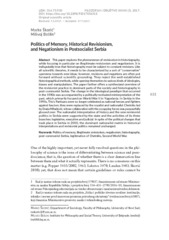Приказ основних података о документу
Politics of Memory, Historical Revisionism, and Negationism in Postsocialist Serbia
Politika sećanja, istorijski revizionizam i negacionizam u postsocijalističkoj Srbiji
| dc.creator | Škorić, Marko | |
| dc.creator | Bešlin, Milivoj | |
| dc.date.accessioned | 2017-12-01T21:36:30Z | |
| dc.date.available | 2017-12-01T21:36:30Z | |
| dc.date.issued | 2017 | |
| dc.identifier.issn | (Online) 2334-8577 | |
| dc.identifier.issn | (Print) 0353-5738 | |
| dc.identifier.uri | http://rifdt.instifdt.bg.ac.rs/123456789/1386 | |
| dc.description.abstract | This paper explores the phenomenon of revisionism in historiography, while focusing in particular on illegitimate revisionism and negationism. It is indisputably true that historiography must be subject to constant revisions. Like all scientific theories, it needs to be characterized by a sort of “conservative” openness towards new ideas; however, revisions and negations are often put forward without scientific grounding. They reject the well-established historiographical methods, while opening themselves to various kinds of ideologies, biases and manipulations. The paper further offers a synthesized overview of the revisionist practice in dominant parts of the society and historiography in post-communist Serbia. The change in the ideological paradigm that occurred in the 1980s was accompanied by a politically motivated reinterpretation of the past, which primarily focused on World War II in Yugoslavia. In Serbia in the 1990s, Tito’s Partisans were no longer celebrated as national heroes and fighters against fascism; they were replaced by the royalist and nationalist Chetniks led by Draža Mihailović, whose collaboration with the occupying forces was purposefully glossed over. The nationalist interpretation of history and the new revisionist politics in Serbia were supported by the state and the activities of its three branches: legislative, executive and judicial. In spite of the political changes that took place in Serbia in 2000, the dominant nationalist matrix in historical interpretations and revisionist politics remained unchanged. | en |
| dc.description.abstract | Polazeći od distinkcije između nauke i pseudonauke, rad se bavi pojavama revi-zionizma u naučnoj istoriografiji sa posebnim akcentom na pojave nelegitimnog revizionizma i negacionizma. Iako nije sporno da istoriografija mora da bude pod-ložna konstantnim revizijama, jer kao i svaka naučna teorija mora da ima neku vrstu konzervativne otvorenosti prema novim idejama, česte su pojave nenauč-nih revizija i negacionističkog pristupa. Ove pojave odbacuju utvrđene istorio-grafske metode uz otvaranje prema različitim vrstama pristrasnosti i manipula-cije. U radu se dalje daje sintetizovan pregled revizionističke prakse u dominantnim delovima društva i istoriografije u postkomunističkoj Srbiji. Promena ideološke paradigme krajem osamdesetih godina prošlog veka donela je i politički motivi-sanu reinterpretaciju, pre svega, Drugog svetskog rata na jugoslvoenskom pro-storu. Umesto dotadašnjih Titovih partizana u Srbiji u poslednjoj deceniji 20. veka rojalistički i nacionalistički četnici Draže Mihailovića bivaju proglašeni za nacionalne heroje i borce protiv fašizma, dok se njihova kolaboracija prećutkuje. Nacionalističko tumačenje istorije i nova revizionistička politika u Srbiji uživala je podršku države kroz delatnost sve tri grane vlasti: zakonodavne, izvršne i sud-ske. Uprkos političkim promenama u Srbiji 2000. dominantna nacionalistička matrica u istorijskim interpretacijama i politici revizionizma, nije promenjena. | sr |
| dc.language.iso | en | sr |
| dc.relation | info:eu-repo/grantAgreement/MESTD/Integrated and Interdisciplinary Research (IIR or III)/43007/RS// | |
| dc.relation | info:eu-repo/grantAgreement/MESTD/Basic Research (BR or ON)/179037/RS// | |
| dc.rights | openAccess | sr |
| dc.rights.uri | https://creativecommons.org/licenses/by-nc-nd/4.0/ | |
| dc.source | Filozofija i društvo/Philosophy and Society | sr |
| dc.subject | politics of memory | sr |
| dc.subject | illegitimate revisionism | sr |
| dc.subject | negationism | sr |
| dc.subject | negationism | sr |
| dc.subject | historiography | sr |
| dc.subject | post-communist Serbia | sr |
| dc.subject | legitimation of Chetniks | sr |
| dc.subject | Second World War | sr |
| dc.subject | politika sećanja | sr |
| dc.subject | nelegitimni revizionizam | sr |
| dc.subject | negacionizam | sr |
| dc.subject | istoriografija | sr |
| dc.subject | postkomunistička Srbija | sr |
| dc.subject | legitimizacija četnika | sr |
| dc.subject | Drugi svetski rat | sr |
| dc.title | Politics of Memory, Historical Revisionism, and Negationism in Postsocialist Serbia | en |
| dc.title | Politika sećanja, istorijski revizionizam i negacionizam u postsocijalističkoj Srbiji | sr |
| dc.type | article | sr |
| dc.rights.license | BY-NC-ND | sr |
| dcterms.abstract | Бешлин, Миливој; Шкорић, Марко; Политика сећања, историјски ревизионизам и негационизам у постсоцијалистичкој Србији; Политика сећања, историјски ревизионизам и негационизам у постсоцијалистичкој Србији; | |
| dc.citation.issue | 3 | |
| dc.citation.volume | 28 | |
| dc.citation.spage | 631 | |
| dc.citation.epage | 649 | |
| dc.identifier.doi | 10.2298/FID1703631S | |
| dc.identifier.doi | 10.2298/FID1703631S | |
| dc.type.version | publishedVersion | sr |
| dc.identifier.fulltext | http://rifdt.instifdt.bg.ac.rs/bitstream/id/2628/skoric.pdf | |
| dc.identifier.wos | 000418565000012 |

